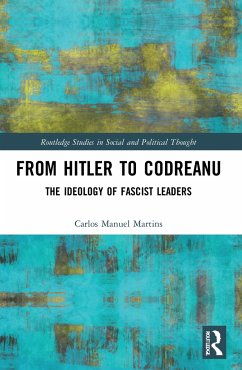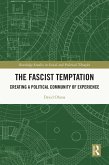This book examines fascist ideology in seven leaders of parties and movements in the interwar period.
It makes use of the conceptual morphological approach, focused on core and adjacent concepts, as well as on the interlinkages between them. With such an approach, the book seeks to offer an innovative perspective on fascism and arrive at a conceptual configuration of fascist ideology, capable of highlighting its main concepts and combinations. Furthermore, it examines the major texts of seven leaders from Germany, Italy, the UK, Portugal, Spain, France and Romania - Adolf Hitler, Benito Mussolini, Oswald Mosley, Rolão Preto, Primo de Rivera, Marcel Déat, and Corneliu Codreanu. With the conceptual approach, the book reasserts the possibility of finding a definition of generic fascism at the same time as depicting the ideological varieties espoused by each leader.
This title will be of interest to students and scholars of fascism, extremism and the far right.
It makes use of the conceptual morphological approach, focused on core and adjacent concepts, as well as on the interlinkages between them. With such an approach, the book seeks to offer an innovative perspective on fascism and arrive at a conceptual configuration of fascist ideology, capable of highlighting its main concepts and combinations. Furthermore, it examines the major texts of seven leaders from Germany, Italy, the UK, Portugal, Spain, France and Romania - Adolf Hitler, Benito Mussolini, Oswald Mosley, Rolão Preto, Primo de Rivera, Marcel Déat, and Corneliu Codreanu. With the conceptual approach, the book reasserts the possibility of finding a definition of generic fascism at the same time as depicting the ideological varieties espoused by each leader.
This title will be of interest to students and scholars of fascism, extremism and the far right.
"This is a book of rare breadth and ambition, resting on elaborate methodological foundations and engaging fluently with comparisons across a wide spectrum of national case studies. Yet Martins's arguments remain both lucid and attentive to differences, never losing sight of conceptual shifts and interlinkages. As an exercise in comparative fascism studies, this book injects fresh relevance to the analysis of fascist charismatic leaders and their ideas. As a reflection on the intellectual components of fascism, it serves as a poignant reminder of why we need to take generic fascist ideology ever more seriously." Aristotle Kallis, Keele University, UK
"This is an excellent and timely book about the ideology of European fascist leaders. Applying the conceptual morphological approach of Michael Freeden to the analysis of fascist ideology, this path-breaking work is an important contribution to the comparative study of authoritarian politics." António Costa Pinto, University of Lisbon, Portugal
"This is an excellent and timely book about the ideology of European fascist leaders. Applying the conceptual morphological approach of Michael Freeden to the analysis of fascist ideology, this path-breaking work is an important contribution to the comparative study of authoritarian politics." António Costa Pinto, University of Lisbon, Portugal








